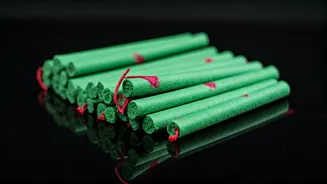Green Crackers, Defined
The shift towards 'green crackers' is central to Delhi's Diwali plans. Unlike traditional crackers, these are manufactured using specific formulations
designed to reduce emissions. They often contain less harmful chemicals and, as a result, produce less particulate matter and noise pollution. The term 'green' indicates that the crackers are formulated to be less detrimental to the environment compared to conventional ones. The aim is to balance festive joy with environmental responsibility, acknowledging the already precarious air quality situation in Delhi, particularly during the Diwali period. These crackers are meant to be a step towards mitigating the usual pollution spike.
AQI: Delhi's Air Quality
Delhi's air quality typically worsens significantly during Diwali, with a surge in pollutants. The Air Quality Index (AQI) acts as a crucial measure, reflecting the levels of various pollutants in the air. Authorities use AQI data to issue warnings and implement measures, such as restrictions on polluting activities. The severity of the AQI determines the measures put in place. The anticipation of ‘severe’ AQI warnings signifies the need for urgent action to reduce emissions and safeguard public health. Continuous monitoring is essential to tracking changes in air quality and evaluating the effectiveness of the implemented strategies, providing a basis for informed decisions.
Regulations & Enforcement
The authorities are responsible for enforcing regulations related to cracker use during Diwali. These measures may involve banning certain types of crackers, restricting the hours when crackers can be burst, and imposing fines on violators. The enforcement mechanisms include deploying monitoring teams, conducting inspections at the retail level, and raising public awareness. Effective enforcement is crucial for the success of any environmental policy, and this is no different for the green cracker initiative. The goal is to ensure compliance and create a noticeable difference in pollution levels compared to previous years. The government also often partners with local communities and organizations to amplify the impact.
Emissions: Impact & Reduction
Green crackers are designed to minimize the emissions of harmful pollutants, such as sulfur dioxide and particulate matter. The technology behind these crackers involves using specific chemical compositions and manufacturing processes that reduce the release of pollutants into the atmosphere. The impact of transitioning to green crackers is the reduction of air pollution. Although green crackers aren't completely pollution-free, they do offer an environmentally friendlier alternative. The collective impact of choosing green crackers is potentially reducing the environmental footprint of Diwali celebrations. This also contributes to improving the overall air quality during the festival season.
Celebrating Responsibly
Celebrations during Diwali can be made more environmentally friendly. Options include purchasing and using only green crackers approved by authorities, minimizing the use of crackers overall, and opting for quieter, less polluting alternatives. Additionally, individuals can choose to celebrate Diwali indoors or in areas with better ventilation, which will reduce their exposure to pollutants. Encouraging community-led initiatives, such as shared celebrations or awareness campaigns, further promotes eco-conscious celebrations. It also increases the positive impact on the environment. Simple actions, like reducing cracker use or participating in community events, can collectively create a significant difference in minimizing pollution.
Beyond Crackers: Other Steps
Besides choosing green crackers, several other measures can contribute to a greener Diwali. Decorating homes with eco-friendly materials, such as LED lights instead of traditional bulbs, helps decrease energy consumption. Additionally, reducing waste by choosing recyclable packaging and composting food scraps will lessen environmental impact. Encouraging the use of public transport, carpooling, or cycling during the festival season can limit vehicular emissions. These activities, along with adopting sustainable choices for gifting, like gifting experiences instead of material items, can reinforce responsible celebrations. Emphasizing the significance of eco-conscious behavior offers everyone a chance to enjoy the festival while minimizing environmental impact.













